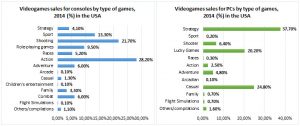The video games industry in the US is revamping

US is one of the major players in the global videogames industry with a turnover of €66 billion. The American videogames industry has recovered from the economic crisis and has been experiencing an important growth (4% CAGR in the past 4 years).
China is the most important market for videogames (€20 billion) counting 534 million online users followed by the US, Japan, Germany, South Korea, the UK, France, Canada and Spain. The US though, remains the leading market in terms of numbers for home consoles, followed by Japan, the UK, France and Germany.
During the period 2012-2015, the overall video games sales in the US increased from
$15,18 billion to $16,51 billion. However, video games consoles sales have decreased, whereas video games sales in other formats (mobile applications, social networks, subscriptions, digital games) have recorded a remarkable growth.

Demand
Video games are increasingly used by all US population segments, regardless of age and sex. The consumption of such products in the US is very high, given that American households possess more than one video consoles of different manufacturers. In particular, according to the Entertainment Software Association (ESA 2015), 4 in 5 American households have at least one video game device and 155 million Americans play regularly video games which translates into 2 players per household in average. 42% out of the 155 million players are regular users (more than 3 hours per week) and on average they spend thirteen (13) years in playing video games.

The average age of US players is 35 years old and the biggest population segment of those players is between 18-35 years old (30%). It is worth noting that the role and participation of female players is getting more and more important for the development of the American video games industry, as they already represent 44% of the total video games players. In addition, the average age of American women users is 43 years old.
Moreover, 59% of American video games buyers are usually male and the average American buyer of those games is 37 years old. Furthermore, 29% of the video games players in the US pay in order to play video games online and 52% of the most frequent gamers feel that video games provide more value for their money than DVDs, music and cinema.
The most popular genre of video games for consoles is action, followed by shooting games, sport games and role-playing games, while the type of videogames which is mostly purchased for PCs is strategy games and to a lesser extent casual games and role playing games.

The main factors that influence the purchasing decision of Americans regarding video games are described below:

Main trends in the video games industry
- Use of the 8th video games consoles generation which will incorporate innovative features and new possibilities for gamers (better performance and graphics across the board which allows greater detail, smoother images and an increase in the amount of onscreen action, easy to record and share in-game footage online)
- Use of multiple monitors for PC games
- Cloud gaming (type of online gaming that runs on a company server rather than on the gamers’ computer or device, allowing for upgrading and improvements without wearing out the capabilities of users’ computers)
- Hyper-connectivity: multi-players and social interaction
- Incorporation of augmented or virtual reality technology which will offer a more engaging and inclusive experience
- Subscription model for video games (mainly massively multiplayer online games/MMORPG), whereby the user pays a monthly fee in order to have access to an online gaming.
- Video games for mobile devices (it is estimated that around 60%-70% of downloadable video games are free)
- Video games addressed to women

Perspectives
The American videogames industry showed signs of improvement the last 4 years and this positive trend is expected to continue until 2021 at a moderate rate (2.5% CAGR). The driving forces for the progress of this sector are the increasing use of mobile technology, the rising number of female users, the deployment of broadband networks as well as the improvement of the US economy and consequently the increase of the disposable household income. In particular, the sales of online video games and the launching of consoles and game titles which integrate innovative features and new possibilities are expected to increase, thus boosting growth in this technology and innovation-driven industry.
This article was exclusively written by DK Consultants for the AMCHAM newsletter.
Sources: Business France 2017, ICEX, 2016, ESA 2016, DK Business Analysis Unit
